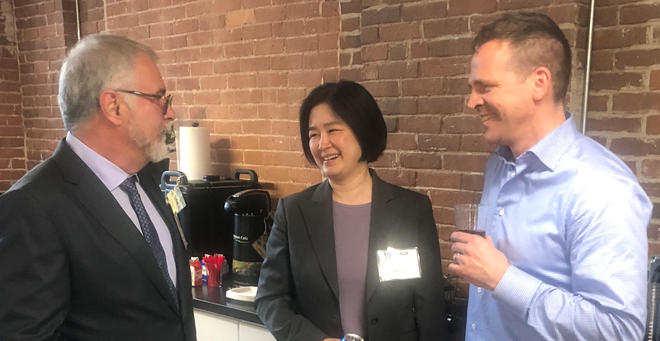
and Jim Glasheen, PhD |
|
The Office of Business Development & Innovation at UMass Medical School announced the first grant awards from a new fund established to support innovative scientific advances at the medical school.
The BRIDGE Fund is guided by an external advisory board of industry leaders and will invest up to $1 million annually in projects by UMass Medical School researchers whose work shows promise for commercialization and translation to a clinical application.
The first recipients of funding are Jie Song, PhD, professor of orthopedics & physical rehabilitation; and Timothy Kowalik, PhD, the Dr. Marcellette G. Williams Distinguished Scholar and professor of microbiology & physiological systems. Dr. Song will investigate “resorbable shape memory bone implants and tissue grafts.” Dr. Kowalik will study “inhibition of human cytomegalovirus infection by a peptide representing the N-terminus of a newly discovered tropism receptor.”
The fund is administered by Jim Glasheen, PhD, executive vice chancellor for innovation and business development and Katherine Luzuriaga, MD, the UMass Memorial Health Care Chair in Biomedical Research; professor of molecular medicine, pediatrics and medicine; and vice provost of clinical and translational research. The fund is managed by Steven Munevar, PhD, MBA, senior business development manager for innovation and business development.
It is expected that BRIDGE Fund awards will make possible critical research that will expedite the advancement of discoveries and technological advances into potentially viable commercial products for diagnosing and treating human diseases.
“UMass Medical School is home to a thriving biomedical research community that attracts nearly $300 million each year in external funding and has earned a global reputation for excellence,” said Michael F. Collins, MD, chancellor of UMass Medical School and senior vice president for health sciences for the University of Massachusetts. “We have noted an increased demand from the life sciences sector to partner with our faculty to advance promising discoveries and are pleased that the BRIDGE Fund will help us to meet that goal in an ongoing, meaningful way.”
Song’s research is focused on synthetic tissue scaffolds that assist in the reconstruction of musculoskeletal tissue following trauma, cancer or metabolic diseases; there are currently about 1 million bone grafts per year in the Unites States alone. Her BRIDGE project will advance work in the area of thermal-responsive shape memory polymers, a class of intelligent materials that can be fixed at a temporary shape below their transition temperature and thermally triggered to resume their original shapes on demand. These materials hold great potential as minimally invasive self-fitting tissue scaffolds or implants.
Kowalik’s work capitalizes on a recent discovery of a novel receptor for human cytomegalovirus (HCMV) and the identification of a peptide inhibitor of HCMV infection that is based on the host-encoded protein, not the genetically pliable viral genome.
HCMV is the leading cause of infection-associated birth defects, with congenital transmission rates resulting in 20,000 to 30,000 new cases in the United States and 200,000 symptomatic congenital infections worldwide. Mounting evidence links HCMV infections with certain cancers, most notably malignant glioma, of which there are approximately 12,000 to 15,000 new cases each year in the United States.
“The broad vision of the scientific community at UMass Medical School is to translate our fundamental discoveries into new therapies for patients. Commercialization is the last step in that translation and the one that is most likely to suffer from lack of timely funding from either NIH or industry,” Dr. Luzuriaga said. “This program will ‘bridge’ that so-called ‘valley of death.’
Dr. Glasheen praised the professionals whose diverse experience and guidance will help the medical school fast-track discoveries that can improve the health and well-being of people everywhere.
“The world-class research community at UMass Medical School is fortunate to be able to draw upon the expertise of such an esteemed group of industry advisors,” said Glasheen, adding that the BRIDGE Fund will be supported by the reinvestment of previously generated commercialization revenue.
The 10 inaugural members of the BRIDGE Fund external advisory board are:
- Julie Frearson, PhD, vice president, global business development & scientific affairs, Charles River Laboratories;
- John Ho, MD, MBA, chief scientific officer, Charles River Laboratories;
- Richard Jacobs, MD, former senior vice president/chief medical officer, Paraxel (retired);
- Chris Kaster, MBA, vice president of business development and venture investment, Boston Scientific;
- Lizabeth Leveille, MBA, head of the Business Development and Licensing Boston Innovation Hub, Merck;
- Louis Myers, PhD, JD, principal, Kendall Square IP Strategies, LLC;
- Lita Nelsen, MS, MBA, former director of MIT Technology Licensing Office (retired);
- Brian Pereira, MD, CEO, Visterra;
- Albert Seymour, PhD, chief scientific officer, Homology Medicines; and
- Arthur Tzianabos, PhD, CEO Homology Medicines.
The academic community at UMass Medical School fosters a culture of innovation and collaboration. UMMS has more than 200 active licenses and earned nearly $60 million in gross licensing revenues in the year ending June 30, 2018.